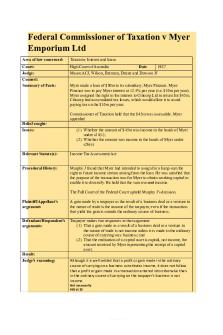Myer Emporium Case 2 PDF

| Title | Myer Emporium Case 2 |
|---|---|
| Course | Taxation |
| Institution | Murdoch University |
| Pages | 2 |
| File Size | 115.3 KB |
| File Type | |
| Total Downloads | 22 |
| Total Views | 141 |
Summary
Download Myer Emporium Case 2 PDF
Description
Mayer Emporium ltd carry business mainly on retail trading and property development. On 6 March 1981 Mayer Emporium lent $80m to it subsidiary (Myer finance Ltd) with interest bearing of 12.5% pa. In the originally planned, Mayer intended to sell the “right to interest” on this loan to Citicorp in exchange to receive a lump sum of $45m and Myer will still be entitled to be repaid the principle of $80m from Myer finance. Now the issue had to decide whether the $45m received by Myer will be assessable under ordinary income. Based on the 2 strand the high court decided that the $45m were ordinary income. 1) There is a profit-making intention on the part of the taxpayer when entering into the transaction
If a business is carried with a view to profit, regardless of whether the taxpayer is carrying on as ordinary course of business whereby the taxpayer has a profit-making purpose thus a profit received will be characterise as ordinarily income. 2) The taxpayer sold a mere right to interest for a lump sum, that lump sum being received in exchange for, and as the present value of, the future interest it would have received. Myer sold the rights to interest on the loan and retained the underlying property and is the same as she continued to receive the interest from its loan and therefore the court conclude that selling the right to receive an income for a lump sum will not change it nature as ordinary income.
Westfield Ltd v FCT (1991) The taxpayer’s purpose in purchasing the land was to keep out a competitor, and if
possible, to participate in the development of a shopping center. And at the time of purchase the taxpayer knew there was a possibility that it might
sell the land to the development of a shopping center. But the selling was not its original intention and eventually the taxpayer did sell the
land to the development. The Full Federal court held that the proceed from sales were not ordinary income. As the sales transaction were not the normal proceed of the taxpayer business. But in the similar case of Myer she did not gain the profit from the her ordinary income but because Westfield did not have the profit intention in the first place from the purchase of land. He only knew there is possibility that the land were to sold to development.
FCT v Whitford’s Beach Pty. Ltd The developer acquired the shares to takes control of the company. The owner of the land remains. Only the shares were sold but not the land. Shareholder declare the purpose was to develop the land however the land was
developed and sold it at a substantial profit. # The high court held that the profit from the developed land was ordinary income. as the development and sales of the land are characterized of a business. And there is an original intention from the developer to make profit from the sales of land. Even though the sales of land are undertaken by the original shareholders, but the developer are the one transformed from the land that held for “domestic purposes” of its shareholders to one that was purely driven to engage in a commercial venture to make a profit....
Similar Free PDFs

Myer Emporium Case 2
- 2 Pages

Myer Emporium case
- 3 Pages

Parts Emporium - Case
- 3 Pages

MYER-Group-Assignment
- 11 Pages

Myer Annual Report 2020
- 52 Pages

Case 2 - Case studies
- 10 Pages

Case 2 - case summaries
- 1 Pages

GMS Case #2 - GMS case study 2
- 2 Pages

BGS CASE 2 CDL Case
- 7 Pages

Northouse Case 2 - Case Note
- 3 Pages

Case Application 2 - practical
- 2 Pages

Case 2 461 - ;;;;;;
- 7 Pages

Case analysis 2 Target
- 4 Pages
Popular Institutions
- Tinajero National High School - Annex
- Politeknik Caltex Riau
- Yokohama City University
- SGT University
- University of Al-Qadisiyah
- Divine Word College of Vigan
- Techniek College Rotterdam
- Universidade de Santiago
- Universiti Teknologi MARA Cawangan Johor Kampus Pasir Gudang
- Poltekkes Kemenkes Yogyakarta
- Baguio City National High School
- Colegio san marcos
- preparatoria uno
- Centro de Bachillerato Tecnológico Industrial y de Servicios No. 107
- Dalian Maritime University
- Quang Trung Secondary School
- Colegio Tecnológico en Informática
- Corporación Regional de Educación Superior
- Grupo CEDVA
- Dar Al Uloom University
- Centro de Estudios Preuniversitarios de la Universidad Nacional de Ingeniería
- 上智大学
- Aakash International School, Nuna Majara
- San Felipe Neri Catholic School
- Kang Chiao International School - New Taipei City
- Misamis Occidental National High School
- Institución Educativa Escuela Normal Juan Ladrilleros
- Kolehiyo ng Pantukan
- Batanes State College
- Instituto Continental
- Sekolah Menengah Kejuruan Kesehatan Kaltara (Tarakan)
- Colegio de La Inmaculada Concepcion - Cebu


